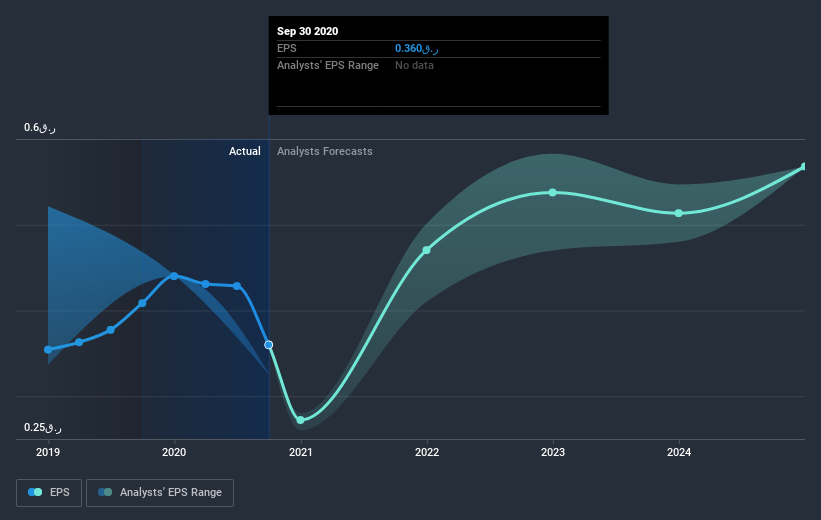Commercial Bank (P.S.Q.C.) (DSM:CBQK) Shareholders Have Enjoyed A 52% Share Price Gain
One simple way to benefit from the stock market is to buy an index fund. But if you choose individual stocks with prowess, you can make superior returns. Just take a look at The Commercial Bank (P.S.Q.C.) (DSM:CBQK), which is up 52%, over three years, soundly beating the market return of 25% (not including dividends).
See our latest analysis for Commercial Bank (P.S.Q.C.)
In his essay The Superinvestors of Graham-and-Doddsville Warren Buffett described how share prices do not always rationally reflect the value of a business. By comparing earnings per share (EPS) and share price changes over time, we can get a feel for how investor attitudes to a company have morphed over time.
During three years of share price growth, Commercial Bank (P.S.Q.C.) achieved compound earnings per share growth of 225% per year. This EPS growth is higher than the 15% average annual increase in the share price. So one could reasonably conclude that the market has cooled on the stock.
The company's earnings per share (over time) is depicted in the image below (click to see the exact numbers).

We know that Commercial Bank (P.S.Q.C.) has improved its bottom line over the last three years, but what does the future have in store? It might be well worthwhile taking a look at our free report on how its financial position has changed over time.
What About Dividends?
It is important to consider the total shareholder return, as well as the share price return, for any given stock. The TSR is a return calculation that accounts for the value of cash dividends (assuming that any dividend received was reinvested) and the calculated value of any discounted capital raisings and spin-offs. So for companies that pay a generous dividend, the TSR is often a lot higher than the share price return. In the case of Commercial Bank (P.S.Q.C.), it has a TSR of 71% for the last 3 years. That exceeds its share price return that we previously mentioned. And there's no prize for guessing that the dividend payments largely explain the divergence!
A Different Perspective
Investors in Commercial Bank (P.S.Q.C.) had a tough year, with a total loss of 2.1% (including dividends), against a market gain of about 8.2%. Even the share prices of good stocks drop sometimes, but we want to see improvements in the fundamental metrics of a business, before getting too interested. Longer term investors wouldn't be so upset, since they would have made 10%, each year, over five years. If the fundamental data continues to indicate long term sustainable growth, the current sell-off could be an opportunity worth considering. It's always interesting to track share price performance over the longer term. But to understand Commercial Bank (P.S.Q.C.) better, we need to consider many other factors. Case in point: We've spotted 2 warning signs for Commercial Bank (P.S.Q.C.) you should be aware of, and 1 of them makes us a bit uncomfortable.
If you are like me, then you will not want to miss this free list of growing companies that insiders are buying.
Please note, the market returns quoted in this article reflect the market weighted average returns of stocks that currently trade on QA exchanges.
If you decide to trade Commercial Bank (P.S.Q.C.), use the lowest-cost* platform that is rated #1 Overall by Barron’s, Interactive Brokers. Trade stocks, options, futures, forex, bonds and funds on 135 markets, all from a single integrated account. Promoted
New: AI Stock Screener & Alerts
Our new AI Stock Screener scans the market every day to uncover opportunities.
• Dividend Powerhouses (3%+ Yield)
• Undervalued Small Caps with Insider Buying
• High growth Tech and AI Companies
Or build your own from over 50 metrics.
This article by Simply Wall St is general in nature. It does not constitute a recommendation to buy or sell any stock, and does not take account of your objectives, or your financial situation. We aim to bring you long-term focused analysis driven by fundamental data. Note that our analysis may not factor in the latest price-sensitive company announcements or qualitative material. Simply Wall St has no position in any stocks mentioned.
*Interactive Brokers Rated Lowest Cost Broker by StockBrokers.com Annual Online Review 2020
Have feedback on this article? Concerned about the content? Get in touch with us directly. Alternatively, email editorial-team (at) simplywallst.com.
About DSM:CBQK
Commercial Bank (P.S.Q.C.)
Engages in the conventional banking, brokerage, and credit card businesses in Qatar and internationally.
Good value with adequate balance sheet and pays a dividend.
Market Insights
Community Narratives



